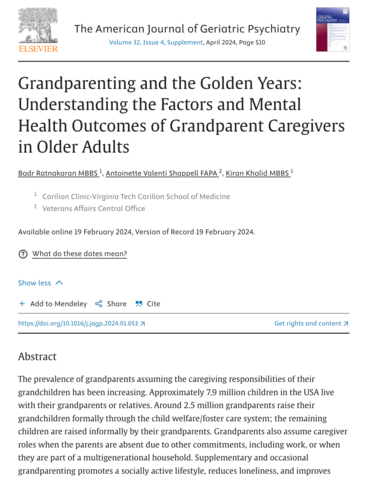Abstract:
The prevalence of grandparents assuming the caregiving responsibilities of their grandchildren has been increasing. Approximately 7.9 million children in the USA live with their grandparents or relatives. Around 2.5 million grandparents raise their grandchildren formally through the child welfare/foster care system; the remaining children are raised informally by their grandparents. Grandparents also assume caregiver roles when the parents are absent due to other commitments, including work, or when they are part of a multigenerational household. Supplementary and occasional grandparenting promotes a socially active lifestyle, reduces loneliness, and improves cognition in grandparents.
However, grandparents can assume primary caregiving responsibilities of their grandchildren due to various reasons, including child abuse and neglect, death, divorce, substance use, and incarceration of the parents. Grandparents with primary caregiving responsibilities for their grandchildren have been found to have high stress levels due to low finances, physical restrictions, and stigma, and have various needs, including information on addressing mental health issues of grandchildren, and social support. Grandparents who are primary caregivers have poor physical and mental health outcomes, including depression, anxiety, cognitive dysfunction, increased inflammatory markers, cardiovascular comorbidities, and mortality.
These outcomes are worse in grandparents belonging to minority and marginalized populations. In our general session, we will discuss the various trends and reasons for the rise of grandparents involved in caring for grandchildren. Their session will also describe the different types of households involving grandparents and grandchildren, including grandfamilies, skipped-generation, and three-generation families, and summarize various theories of grandparent stress including role strain theory and social exchange theory. Specific focus will be given in our session to culturally diverse and marginalized populations, including minorities, and grandparents involved in the custodial care of their grandchildren.
The session will review the various pathways to custodial care by grandparents and their needs. Their session will elucidate the positive and negative outcomes of grandparents taking care of their grandchildren, including mental health and well-being, and how they can be addressed during clinical encounters with our patients. They will appraise the current evidence of interventions for grandparents including social support and parenting skills.
The authors also recommend potential solutions and future directions to improve outcomes in grandparents caring for their grandchildren. At the conclusion of their session, handouts with salient learning points from our session will be provided for our audience members to assist in their encounters with grandparents caregiving for their grandchildren.

